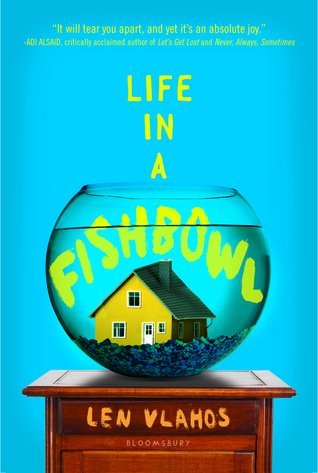Life in a Fishbowl - Len Vlahos
Gone is her mom's attention and cooking and parent-teacher conferences. Gone is her sister's trust ever since she's been dazzled by the cameras and new-found infamy. Gone is her privacy. Gone is the whole family's dignity as ATN twists their words and makes a public mockery of their lives on Life and Death. But most of all, Jackie fears that one day very soon her father will just be . . . gone. Armed only with her ingenuity and the power of the internet, Jackie is determined to end the show and reclaim all of their lives, even in death.
This book is odd. A good kind of odd, but odd nonetheless. I should start by saying that the synopsis isn't really accurate. Though the idea of the reality show is present in the text, it is more of a catalyst than a focus of the majority of the narrative. The same goes for Jackie Stone. The synopsis gives the impression that Jackie Stone is the protagonist, when in fact there are multiple narrators throughout the novel, including a nun, a terribly entitled young billionaire, multiple members of the Stone family, a young Russian pen pal, the reality show producer, and even Jared Stone's brain tumor.
The high-grade glioblastoma multiforme tumor liked Jared Stone's brain. It liked it a lot. In fact, it found it delicious.
Like most living things, the tumor had no idea how it had come into being. Much as a baby emerges from the womb and finds its mother's nipple, the glioblastoma simply woke up one day eating its way through the gray matter in Jared's frontal lobe and knew that it was pleased to be there.
The book covers some really interesting conversations about things like euthanasia, suicide, the role of religion in these decisions, and the effects of entitlement on ethical decision-making. Life in a Fishbowl is not perfect--some of these philosophical discussions feel a bit too much like Vlahos's own voice is entering into the narration--but it is a book that will make readers think. Though some might actually be tempted to categorize the book as humor, at least to a degree, I feel it reads more as satire. The observations of our fascination with reality television, along with the impacts of terminal illness on familial bonds and social interactions, are thoughtfully woven into the multiple narrative arcs.
A bizarre, but ultimately illuminating story, highlighting the complex ethical considerations surrounding the subject of euthanasia and long-term illness. Amidst the moments of confusion and sometimes jarring transitions between narratives, the text makes for an entertaining, possibly cathartic read!
Recommended
(NOTE: This review is from an Advance Reading Copy - Out Jan. 3, 2017)

Comments
Post a Comment